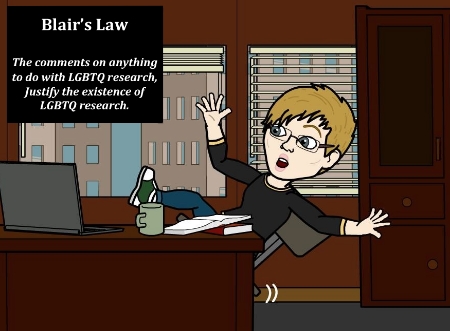In this TedX talk, Panti Bliss discusses same-sex PDAs, homophobia, and the tireless stress put on same-sex couples simply attempting to navigate the world like any other couple, but constantly having to be vigilant about their surroundings.
Read MoreWhat's the Worst That Could Happen? Fears of Visiting the Doctor for a Sexual Health Exam!
As I was scrolling through my newsfeed on Facebook today, a College Humour video popped up providing a wonderful "POV" (Point of View) take on a woman's experience visiting the Gynecologist for a routine checkup. According to a recent paper that our lab published, the video, although intended to be entertaining, does a pretty good job of covering some of the primary concerns that women have about a sexual health exam - but with one major caveat: the women in question need to be cisgender, heterosexual women for this video to apply!
Read MoreOn the Surprising Sources of Research Motivation
A year ago today I made a post on Facebook about some of the surprising places that I find the motivation to do my research. Unfortunately, in my line of research, quite often the motivation that keeps me going comes from tragedy, although it does also come from positive experiences as well. A year ago, I was uncertain of where I would find a home for my research and so the need for motivation was that much stronger. I doubt that I am alone in finding motivation from the tragedies that surround us. In fact, it seems that almost all researchers are motivated in some way by something that is "wrong" - whether that be a problem with the environment, a health condition, or, in my case, societal levels of discrimination.
Read MoreWhy Study LGBTQ Psychology? Because God Loves Uganda
From time to time, I get asked why I study LGBTQ psychology, same-sex relationships or, more colloquially: “gay stuff.” When I began graduate school, I never intended on studying “LGBTQ Psychology,” and in fact, I had never heard of such an area of psychology, and wouldn’t for many years.
Read MoreAre Close Relationships Researchers Getting Better at Using Inclusive Research Methods?
I’ve written about inclusive research practices before, and have placed an emphasis on the importance of including gender and sexual minorities in relationships research. Although psychological research in general has come a long way in being more inclusive with respect to studying topics of relevance to LGBTQ populations, close relationships research still seems to be a bit slow on the uptake. But, to be fair, it can be sometimes difficult to really judge what is currently going on in a field if one only relies on the currently published articles available in scientific journals. After all, not all research gets published, and even when it does get published, it is often years after the initial study was designed. Consequently, a survey of the most recently published close relationships articles might only provide a ‘snapshot’ of the research practices that were prevalent between 2010 and 2013 (or even earlier). Perhaps a better opportunity to get a more current snapshot of the field’s practices is by examining poster presentations at a large conference, such as the Society for Personality and Social Psychology’s Annual Meeting. The advantage of examining poster presentations is that they tend to be reporting more recently conducted research and they provide a sampling of studies that have already been published, those in the process of being published, and those that will never be published (either because they get rejected or because publication just isn’t pursued).
Read MoreSexuality Pre-Conference at SPSP 2014
For the first time ever, the Society for Personality and Social Psychology's Annual Meeting included a Sexuality Pre-Conference. The speakers included: Lisa Diamond, Sari van Anders, Jose Bauermeister, Martie Haselton & Terri Conley.
You can view the live video feeds from the individual talks by clicking here.
We had a lot of wonderful live tweeters at the conference, so take a look at their scrolling summary below.
Read MoreThe Assumption of Bias in LGBTQ Research
In a recent post on the GapJunctionScience blog, Sari van Anders pointed out that one connection between science and feminism is their seemingly equal ability to bring out nasty comments.
Read MoreAre Public Displays of Affection Good for Your Health?
To hold or not to hold…hands, that is. When you’re in a relationship, are you a hand-holder, or do you prefer to keep your hands to yourself? Perhaps you find your hand gets too sweaty when in the embrace of another, or maybe you only hold hands seasonally when doing so will provide you with an extra bit of needed warmth in the deep freeze of January.
Read More15 Years After Matthew Shephard
There was no such thing as an "anti-gay hate crime" in the United States when Matthew was killed, but the brutality of his death and the fact that it was motivated purely and simply because of his sexual identity, awoke in many a need for hate crime legislation.
Read MoreSocial Support for Relationships Part 2
In my last post on social support for relationships, we learned that couples who receive social approval of their relationships from their friends and family are more likely to report greater relationship satisfaction and more enduring relationships. One of the key points researchers have made in this area is that it is the perception of support/approval that matters most.
Read MoreI Wanna Hold Your Hand, But What If It Isn't Safe?
This past year has seen an increase in hate crimes targeted at the LGBTQ community, and especially same-sex couples holding hands or engaging in other forms of public displays of affection, or PDAs. Nick Porto and Kevin Atikns, a gay couple living in New York city, were knocked to the ground and violently attacked in broad daylight while walking down the street holding hands.
Read MoreMade In America: Russia's Proposal to Remove Children from Same-Sex Parented Households
According to a Russian journalist and LGBTQ activist, that’s exactly what they need to do. Earlier this year Russia made adoption, foreign and domestic, by same-sex parents illegal and also passed what they call the “anti-propaganda” law, which all but criminalize same-sex sexuality.
Read MoreThe Challenge of Valentine's Day
Unlike some people, I’m a big fan of Valentine’s Day. Sure, it’s been commercialized to the point that Valentine’s day candy appears on the store shelves the day after Christmas, and yes, you shouldn’t need to wait for one particular day of the year to express your feelings for the person (or people) you love, and yes, perhaps it’s a day that appears to rub coupledom in the face of all the singletons, but I still love it anyway.
Read More"I'm Straight. LGBTQ Participants Wouldn't Trust Me, Would They?"
Yep. I’ve heard this reason given by researchers as to why they do not include LGBTQ participants in their studies. By this logic, I suppose I shouldn’t have any heterosexuals in my studies! Ludicrous!
Read MoreExclusion Based on Vulnerable Population Status
We need to justify our use of a vulnerable population. I have heard this reason from a number of researchers, often ones who would very much like to include LGBTQ individuals in their sample, but who feel that their hands are tied in doing so because their institution or review board (or both) require that they justify the use of any subjects belonging to a ‘vulnerable population.‘
Read More
Reasons for LGBTQ Exclusion in Research
For the most part, I often find the “reasons” touted for not including LGBTQ participants to be more along the lines of excuses.
Read MoreOn Being An Inclusive Researcher
What do I mean by “inclusive researcher”? In any research that involves human subjects (or even research that doesn’t), the process of selecting a sample is very important.
Read MoreBlirth: Or the Birth of the KLB Research Blog
LGBTQ Psychology is an exciting and emerging field of psychological research and practice that seeks to include individuals of all sexual and gender identities.
Read More






